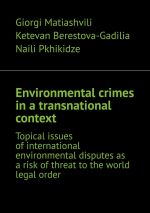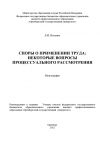Правообладателям!
Представленный фрагмент книги размещен по согласованию с распространителем легального контента ООО "ЛитРес" (не более 20% исходного текста). Если вы считаете, что размещение материала нарушает ваши или чьи-либо права, то сообщите нам об этом.Читателям!
Оплатили, но не знаете что делать дальше?
Текст бизнес-книги "Environmental crimes in a transnational context. Topical issues of international environmental disputes as a risk of threat to the world legal order"
Автор книги: Naili Pkhikidze
Раздел: Юриспруденция и право, Наука и Образование
Возрастные ограничения: +16
Текущая страница: 1 (всего у книги 3 страниц)
Environmental crimes in a transnational context
Topical issues of international environmental disputes as a risk of threat to the world legal order
Giorgi Matiashvili
Ketevan Berestova-Gadilia
Naili Pkhikidze
© Giorgi Matiashvili, 2022
© Ketevan Berestova-Gadilia, 2022
© Naili Pkhikidze, 2022
ISBN 978-5-0056-2040-8
Created with Ridero smart publishing system
GIORGI MATIASHVILI

MBA BACHELOR EN DROIT INTERNATIONAL. INTERNATIONAL LAWYER.Member of an,,International Bar Association,, IBA, a,,World Academy of Science Engineering and Technology,, WASET a,,European society of International Law,, ESILSEDI. Author of а book and scientific articles in international journals.
Contact information: [email protected]
KETEVAN BERESTOVA-GADILIA

DOCTORAL CANDIDATE OF Ph. D IN LAW.Real member, of TAO-KLARJETI SCIENTIFIC ACADEMY. With 20 years of experience working in private and public structures. Author of a book and scientific articles in top international journals.Contact information:[email protected]
NAILI PKHIKIDZE

Ph.D.in Law, Real member, ACADEMICIAN of,, FAZISI ACADEMY,, With 27 years of experience working in private and public structures. Author of books and scientific articles in international journals.
Contact information: [email protected]
Translation made: ZHANA TCHOLARIA. Master of Education (M. Ed). E-mail:[email protected]
*Abstract
,,As we progress into the twenty-first century, anyone who considers themselves a realist will have to make the environment a top priority.” -Leonardo DiCaprio
Extreme heat wave, severe forest fires, floods and other types of natural disasters around the world confirmed undoubtedly, that this is a climatic disruption, which turned out into a large-scale extreme situation for our entire planet.
,, God finds the quilty’”, as Homer said, and we entered in to the period of consequences. Governments simply observed, how the disasters spread out, striving forward to new pipe system and annual trillions in subsidies of fossil fuel. Correspondingly, against the background of commercial interests and striving for material wealth, they forgot and put under question tomorrow’s existence of their own habitat.
At the end of the 60s of the twentieth century, the United Nations Organization drew the attention of the world community to the rampant pollution of the environment and the exhaustibility of natural resources as one of the global problems of our time. Overgrowth of technological progress has changed the rules of the game of survival.
The emergence of international environmental law as a separate legal regime was a very important event in the late 1920s.
Environmental law represents the distinctive sub-discipline of public international law. The international community had been alarmed by environmental damage and technological disasters, which had tendencies to become more and more destructive. However, international environmental law has achieved considerable progressive growth and continues to adapt to the corresponding changes in the echo of the results of technological progress, but the state of the world’s environment continues to deteriorate.
The world community acknowledged, that the actual and potential consequences of the degradation of ambient environment are becoming such a serious, that the humankind and order of nature are under threat of extinction and therefore, it is necessary to pay more attention to prevention of the damage of ambient environment. In this regard, the use of international criminal justice to protect the ambient environment has become urgent. The consequences of some ecological disasters are perceived far beyond national borders, this is why, more stringent measures are needed to stop the repetition of events. The goal of our century is to turn back the tide of this process by making sure, that the governments are fully performing their obligations and gradually undertaking more stringent responsibilities in order to preserve the ambient environment.
This thesis, which is analyzing the spectrum of judicial bodies that deal with solving of environmental disputes, proposes a re-evaluation of their topicality in modern conditions. We think this thesis is especially topical in an epoch, when the issues of ambient environment are increasingly becoming the subject of consideration of international jurisdictions, and will represent the interest to those interested in this area of vital importance.
This thesis studies the international environmental crisis of the modern world and we tried to substantiate the necessity for international cooperation between states in the environmental field.
In our opinion, the development of international environmental cooperation should follow the road leading to the creation of a single international legal environmental law, one international environmental organization, and also one international environmental court.
International environmental law represents a very specific branch of international law, therefore, the judges should be experts in the field not only of ecology, but also specialists in the aerobatics of legal science – International law.
Both the state and international governmental and non-governmental organizations, as well as natural persons should have the right to access to international environmental justice without restriction.
Within the framework of international law, the fulfillment of the obligations undertaken by all states serves as a guarantor of the stability of the ecosystem of the world and the peaceful coexistence of states with different socio-political systems. In the modern world, primary importance is given to the issues of compliance by all subjects of international law of international obligations, related to compliance with the terms of the 1975 Helsinki Agreement. The obligations include: protection of ambient environment, prohibition and non-proliferation of weapons of mass destruction, prohibition of the elaboration, production, transportation, proliferation and use of chemical and biological weapons, etc.
According to Article 2 of the Resolution of UN General Assembly “On the responsibility of states for internationally wrongful acts,” to the elements of an internationally wrongful acts of a state refer to violations of an international legal obligation of that state. And according to the article 12 of the abovementioned resolution “There is a breach of an international obligation by a state when an act of that state is not in conformity with what is required of it by that obligation, regardless of its origin or character. Part II of the abovementioned resolution discloses the content of the international responsibility of states. It considers general principles (chapter I) and forms of indemnification (chapter II) by a State for its internationally wrongful act. Violation of the undertaken obligations within the international and interstate treaties, firstly, creates a threat to the existing system for the implementation of international agreements, and, secondly, generates the legal responsibility for failure to fulfill the obligations undertaken under the treaty.
The principle of fulfillment in good faith of obligations these days represents the main core of the existence of the structure of international law as a source of legal force of this law and interstate relations, since without fulfilling obligations incompliance with the international law, a civilized relationship between subjects of international law to achieve the goals provided for by the UN Charter is impossible. The importance of this principle is indicated in the preamble of the UN Charter, which indicates “The respect for obligations arising from treaties and other sources of international law,” and in part 2 of article 2 of the UN Charter, which states that “All Members of the United Nations Organization shall fulfill in good faith the obligations undertaken by them in accordance with the present charter, in order to ensure to all of them collect of rights and advantages arising from belonging to the membership of the Organization. Hereinafter, the principle of fulfillment in good faith of obligations according to international law received reinforcement in individual international norms, in particular: in the statutes of International Court of Justice of United Nations organization (Article 38); Declarations on the principles of international law. These are generalized norms that reflect the characteristic features and the main content of international law, having supreme legal force.
The underlying principles of international law are fixed in the UN Charter; Declaration on the principles of international law concerning friendly relations and cooperation between states in accordance with the 1970 UN Charter; In the final act CSCE 1975y.
Organization for Security and Co-operation in Europe (OSCE), the world’s largest regional security organization is engaged in security issues. It unites 57 countries located in North America, Europe and Central Asia.
The former name is Conference for Security and Cooperation (CSCE) in Europe. It was convened as a standing international forum of representatives of all European states (except Albania and Andorra), as well as the United States and Canada, to develop measures to reduce military confrontation and strengthen security in Europe. The meeting was held in three stages.
July 3 – 7, 1973 – Helsinki – Conference of Ministers of Foreign Affairs;
September 18, 1973, July 21, 1975 – Geneva – Introduction of proposals, amendments and agreement on the text of the Final Act;
July 30 – August 1, 1975 in Helsinki-the capital of Finland, the leaders of 35 original member nations signed the final act of the conference on Security and Cooperation in Europe (Helsinki Accords).
– Vienna Convention on the Law of Treaties 1969 (preamble, articles 26, 31, 46).
Vienna Convention on the Law of Treaties emphasizes the important role of international treaties, as “a source of international law and as a means of developing peaceful cooperation between nations, regardless of their differences in their state and social system”, in all fields of cooperation.
Not only abovementioned, but also other principles of international law form the foundation of the law of environmental safety and international security. This provision was specially emphasized by the UN General Assembly. Effective collective measures can only be carried out on the basis of respect for the principles of sovereign equality, non-interference in internal affairs and self-determination.
Respect for human rights and democracy are of paramount significance to prevent a threat to the world. Everyone has the right to life, and the state and the international community as a whole must ensure an international setup, where in this right can be fully realized (Article 3 and 28 of Universal Declaration of Human Rights). From this, the human right to peace is emerging, which is associated with the right to peace of the people and the state. In the Declaration on “the Right of Peoples to Peace”, the ensuring of which is the fundamental obligation of states. And this also obliges them to apply the principles of the peaceful settlement of disputes, both intrastate and international, disputes of a different nature, including environmental disputes.
We hope, that this thesis will help to improve understanding of the relationship between the protection of human rights in accordance with the “European Convention on Human Rights” and the ambient environment.
*Keywords
Ecology, offense, human rights, resources, court, international, environment, environmental crimes, international law, human, hostile use, planet, environmental security, ecological environment (ecosystem), declaration, ecocide, international treaties, eco-terrorism, United Nations (UN), obligations, legal order, peace, law, justice, cooperation, state, damage, international legal responsibility.
*Preface/annotation
Human Being is part of nature. Outside of nature, without using its resources, he/she cannot exist. Nature will always be the basis and source of human life. In relation to a person, it performs a number of functions related to the satisfaction of his/her needs: ecological, economic, aesthetic, recreational, scientific, cultural and so on.
Ensuring a favorable quality of ambient environment and the organization of rational management of natural resources represents one of the most urgent problems of the entire world community. The awareness of the onset of the global environmental crisis by the authorities of most states of the world in the middle of the 20th century led to the formation of international cooperation in the field of ambient environment protection and a dynamic change in intrastate environmental legislation in most countries of the world. Despite the absence of a general framework agreement, the ambient environment is protected by international law. Various international treaties regulate specific environmental issues, such as for example climate change or biodiversity.
These treaties and ordinary international law assign various legal obligations to protect the ambient environment. This function is assigned to states, such as the obligation to inform, cooperate or limit wash-outs.
The proclamation of the human right onto a favorable ambient environment in the declaration of principles, adopted at the UN Stockholm Conference on the ambient environment in 1972, led to implementation (The English word-implementation is officially translated by the UN as “Effectuation”). The term was first used by the Human Rights Committee in 1981.
The original meaning of the word “implement” is to actualize something in life. it is the practical implementation within the state of international legal norms in order to fulfill the obligations assumed. With regard to the law, implementation is the actualization at the intrastate level of obligations envisaged in international agreementsinternational environmental norms and standards in the legislation of the countries of the world.
This was the impetus for the formation of environmental legal awareness among the population, the growth of the public environmental movement and the formation of judicial practice in cases of protecting the rights and legitimate interests of citizens in the field of environmental protection. All measures aimed at overcoming the crisis in the environmental field require the need for cooperation between states in the form of C-Global – a global dialogue format, and only through the joint efforts of all states, it is possible to fight against the environmental crisis. The most important issue of the new paradigm of sustainable development should be the reassessment of the environmental factor. Preservation and reproduction of the ambient environment should become an obligatory condition for the sustainable development of civilization. The representatives of the sciences society of international law not infrequently drew attention to the need to strengthen the international legal basis for environmental cooperation and create truly effective international control mechanisms in this field.
In our opinion, the development of international environmental cooperation should follow the principle of creating a single international legal environmental act, of one international environmental organization, and of one international environmental court.
&1 International law as the basis of the international legal order
The representations on peaceful existence has been evolved from the ideas about the artificiality of peace and the naturalness of hostility and war to humanity and the individual to the axiomatic concepts extoling universal peace on the planet as the only means to avoid nuclear and environmental catastrophe. Globalization can contribute to the awareness of the fragility of the entire human civilization and the uniqueness of its constituent socio-cultural formations. In our opinion, in order to achieve peace on the planet, it is necessary to abandon attempts to unify it by force. All the richness of the nature of planet Earth and human culture cannot be simplified and unified within the framework of one geopolitical, economic and cultural paradigm. It is this kind of aggressive attempts that can lead to the complete destruction of humankind and ecological environment of his habitat. In recent decades, the problem of preserving the whole world and ecosystem (ecological system) on our planet are becoming more and more relevant, overwhelmed by various political, social and geopolitical contradictions and side effects of scientific and technological progress.
One can rightfully speak of the 21st century as an era of exacerbation of civilizational conflicts and confrontation of civilizations at a new qualitative level.
International law, its principles and basic norms help to resolve the problem, which determine its nature and create support for its other norms and institutions, contributing to the stability of international relations. They represent the foundation of the international law and order. Violation of the basic principles of international law affects the rights and interests of most other members of the international community. International law is a system of legal principles and norms governing relations between states. International organizations can also act as subjects of international law. Sources of international law are international treaties and custom recognized by states. As there is no supranational authority over sovereign states, the international law is the law between states, not over them.
Which law is more important: International or National, the answer to this question depends on the legal traditions of a particular country. Most legal theorists believe that globalization processes will only become aggravated in the future. Problems that require joint efforts, such as transnational crime, ecological and technogenic safety; prevention of armed conflicts; protection of human rights will come to the fore. This will lead to the prevalence of international norms of law over national ones. Already, many countries have fixed in the basic laws the provision for such a priority. International law in most of its norms, which are recognized by all states of the world, is universal. In the part recognized not by all, but by most countries of the world, it is called general. The norms of international law established by the countries of one region create regional international law. The norms established by states in any field, for example, in energy, or in the field of production and marketing of oil, in navigation or air traffic, are called sectoral.
The norms establishing the rights and obligations between the two states are contained in numerous bilateral treaties.
At present, the central part of international law is the UN Charter, which contains the basic principles of modern international relations, obligatory for execution by all countries and possessing supremacy in relation to all other norms of international law.
Under the charter of the United Nations Organization, states pledged to develop friendly relations among nations based on respect for the principle of equal rights and self-determination of peoples, to fulfill in good faith the obligations assumed under the charter, to observe the principle of sovereign equality of all UN members, to resolve their international disputes by peaceful means in such a way as not to jeopardize the international peace, security and justice, to refrain in their international relations from the threat of force or using the force against the territorial integrity or political independence of any state, or in any other way, commit acts inconsistent with the purposes of the United Nations (UN). In addition, the UN Charter approved the principle of non-intervention in matters, essentially included within the domestic jurisdiction of any state (this principle, however, does not affect the application of compulsory measures on the basis of the Charter).
The basic principles of the UN Charter were confirmed and expanded in the declaration on principles of International Law, concerning friendly relations and cooperation among states in accordance with the UN Charter (October 24, 1970), and later in the Final Act of the Conference on Security and Cooperation in Europe, adopted in 1975 in Helsinki.
The declaration on principles of International Law concerning friendly relations and cooperation among states in accordance with the Charter of the United Nations (October 24, 1970) provided that: States shall refrain in their international relations from the threat with force or use of force against the territorial integrity or political independence of any state, or in any other manner inconsistent with the purposes of the United Nations.
States shall resolve their international disputes by peaceful means in such a way as not to endanger international peace, security and justice. States are bound by the Charter not to interfere in matters within the domestic jurisdiction of any state. States are obliged to cooperate with each other in accordance with the UN Charter.
By virtue of the principle of equal rights and self-determination of peoples, envisaged in the charter, all peoples have the right to freely determine their political status and pursue their economic, social and cultural development without outside interference, and every state is obliged to respect this right in accordance with the provisions of the charter. All states enjoy sovereign equality, they have the same rights and obligations and are full-fledged members of international society, regardless of differences of an economic, social, political or other nature. Each state is obliged to fulfill in good faith the obligations assumed by it in accordance with the UN Charter, arising from the generally recognized principles and norms of international law, as well as arising from international treaties valid in accordance with the generally recognized principles and norms of international law. All the above-mentioned principles have been repeatedly confirmed in other declarations and other foundational documents contained in the resolutions of the UN General Assembly. Herewith, it was found that, in interpretation and application, the above-mentioned principles are interrelated and each principle must be considered in the context of all other principles.
The norms of international law define the basic concepts and institutions of international relations, as well as the related rights and obligations of states and international organizations. They contain the definition of the state, its sovereignty, territory, population, and the concept of legal succession of states, their international legal responsibility as a subject of international law. These norms also define the institutions of an international treaty, negotiations, intermediation, international conflicts, peaceful settlement of disputes, representing the methods of implementation of relations between states.
As noted above, there are branches in the system of norms of international law, in which norms related to certain areas of international regulation are grouped.
Diplomatic and consular law regulates the representational relations of states and the rules for servicing citizens and trade and economic organizations abroad.
In the field of international security and disarmament, the norms of international law determine the order and guarantees for the maintenance of international peace.
Maritime law regularizes the regime of maritime spaces and their use.
Law of the air defines the rights and obligations of states in connection with air communication.
Law of outer space determines the probing procedure and exploitation of outer space.
International humanitarian law consolidates and promotes the development of human rights.
A separate branch is made up of norms that determine the order for economic and scientific and technical cooperation between states, international legal protection of the ambient environment, etc.
Правообладателям!
Представленный фрагмент книги размещен по согласованию с распространителем легального контента ООО "ЛитРес" (не более 20% исходного текста). Если вы считаете, что размещение материала нарушает ваши или чьи-либо права, то сообщите нам об этом.Читателям!
Оплатили, но не знаете что делать дальше?







